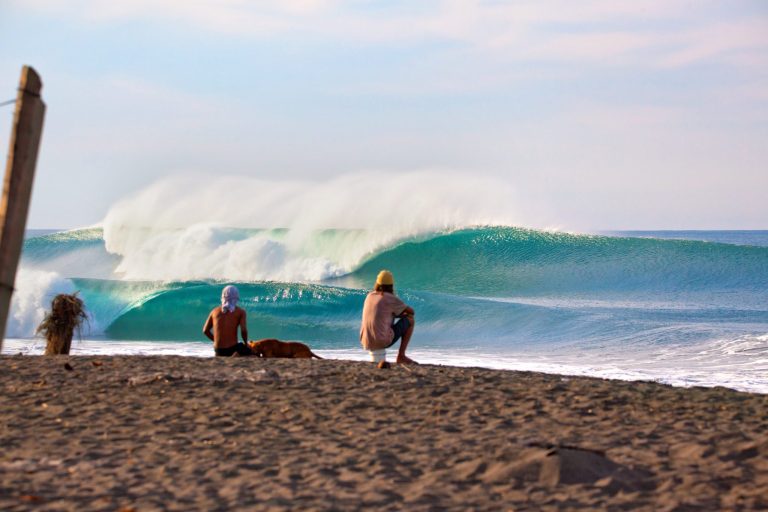Ready to catch a wave off the coast of Mexico’s beaches? Mexico has an incredible 4,500 miles of coastline on the Pacific Ocean side alone, stretching from Northern Mexico just south of San Diego, to the Baja California Peninsula, through the state of Oaxaca, located in the far south of the country. Pack your board and get ready to paddle out.
A word on safety in Mexico
Whether you’re taking a surf vacation in one of the country’s many charming surf towns or headed for one of the top surf spots located near a resort destination, it’s important to keep safety in mind. While tourist destinations are typically safe for international travelers, always check the US government’s Mexico travel advisory page before planning your Mexico surf trips. You can also read more about health and safety while traveling in Mexico.
The Mexico surfing season
The best time to surf in Mexico depends on your skill level. The winter months, from November to March, are best for beginner surfers, as the waves are smaller and more predictable. Note that if you’re surfing in winter, especially up north, you’ll want to pack a wetsuit.
Experienced surfers flock to Mexico in the summer months, between April and October. That’s because the waves are bigger, the water is warmer, and the Pacific hurricane season (which peaks from July to October) churns up some major swells.
Where to surf in Mexico

Ensenada, Baja California
Located just outside Tijuana in Northern Baja and only a two-hour drive from San Diego, Ensenada has long been a popular surfing destination. While the water can be cold, the waves are worth it. Beginners will want to stick to Playa Hermosa, while experienced surfers can check out Todos Santos and San Miguel, the latter of which is known for its consistent breaks.

East Cape, Baja California
Located on the southern tip of the Baja Peninsula near the resort destinations of San Jose del Cabo and Cabo San Lucas, East Cape is famous for its right point breaks and south swells that arrive between April and October. This surf spot is located where the Pacific Ocean meets the Sea of Cortez and is popular with surfers, due to its proximity to tourist destinations. So, expect to wait your turn to drop in.

Sayulita, Nayarit
Surfers of all kinds, from beginners to experts, like to call upon Sayulita, not only for the surfing at beaches including Playa Sayulita and Playa Carricitos, but for the colorful, laid-back vibe of the town. Sayulita is located just 30 miles from Puerto Vallarta, but is a world away, with a bohemian feel, charming accommodations, great fish tacos, and incredible sunsets.

Cuyutlán, Colima
Blink and you might miss the Mexican state of Colima, but that’s part of its charm for surfers. The town is a sleepy village best known for its gourmet sea salt, but surfers come for the famous “Ola Verde” or Green Wave. The thundering surf is best left to surfers with serious skill. The wave at Cuyutlán is a beach break barrel, and waves can reach 20 feet high in the summer months.

The Ranch, Guerrero
For surfers looking to avoid crowds, this off-the-beaten-path surf destination offers solitude and great waves—unlike the busier surfing scene at Playa Troncones, located just a bit further south on the way to Zihuatanejo. The Ranch boasts a strong swell, reliable winds, and an exposed point break. Waves at the Ranch are best for experienced surfers in autumn and winter, with the rest of the year being ideal for beginners.

Puerto Escondido, Oaxaca
Southern Mexico’s Puerto Escondido is perhaps Mexico’s best-known surf destination, with jaw-dropping waves that attract professional surfers from all over the world (the area is home to a surf break known as the “Mexican Pipeline.”) While the area does have a few beaches that are good for beginners, Puerto Escondido is expert surfer territory. Zicatela Beach regularly plays host to world-class surf competitions, like the MexPipe Challenge and the ESPN X Games.
Don’t forget to pack your travel insurance
Ready to tackle Mexico’s best waves? Remember to purchase a travel insurance policy before you head out. battleface travel insurance not only provides travel medical coverage if a wave gets the best of you while on your Mexican surfing vacation, but you can also add on gear protection that may reimburse you if your board gets damaged or lost en route to your destination. Then get out there! Mexico’s best surfing spots await.

How safe is Mexico City?
As the largest city in North America, Mexico City is bursting with unforgettable travel experiences, from an incredible array of world-class museums and cultural experiences

What’s the climate in Canada like?
Canada is a vast country which rightly has a reputation for cold and snowy weather. Its northern latitude positioning and the presence of the massive
